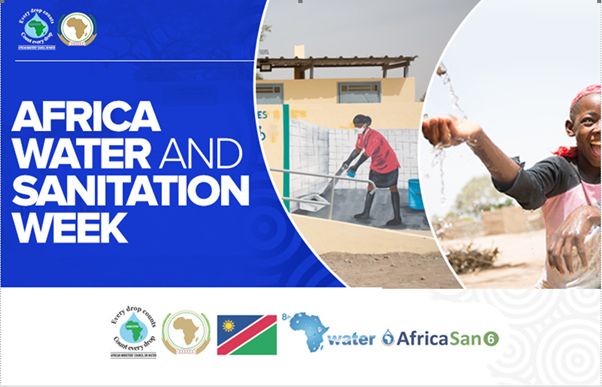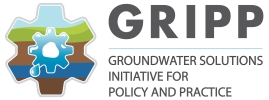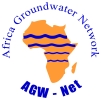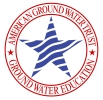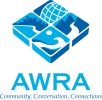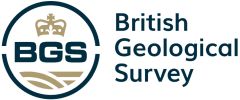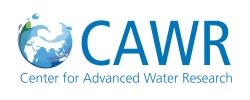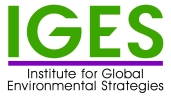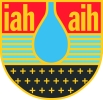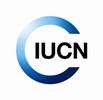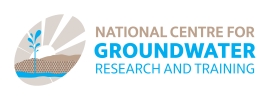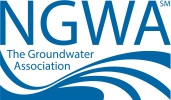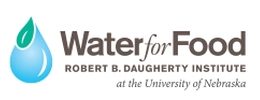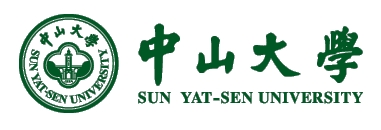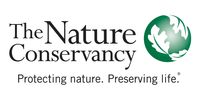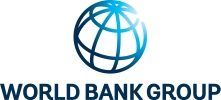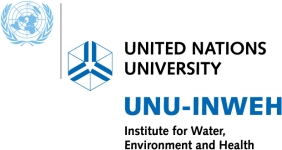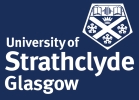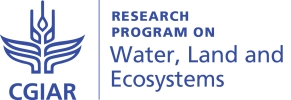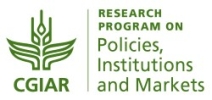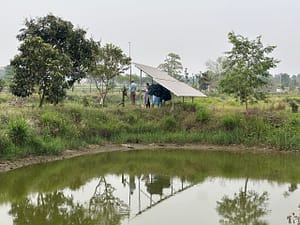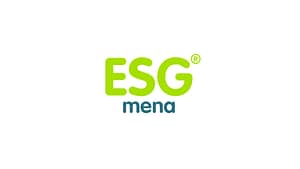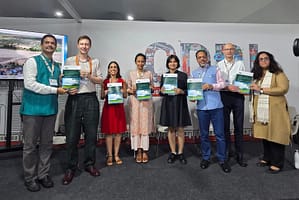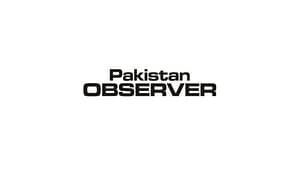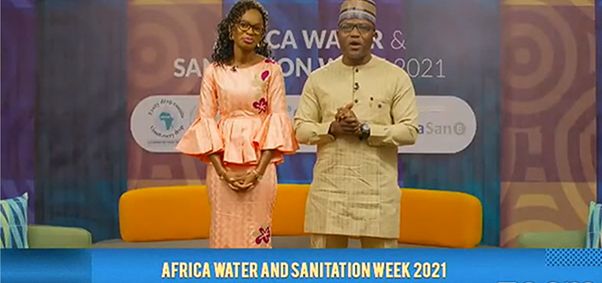
Maïmouna Tall, Communications and Visibility Manager, AMCOW, and Kitchinme Bawa, Sanitation Project Manager, AMCOW, at the AWSW Closing Plenary (photo: AMCOW).
The 8th Africa Water Week (AWW8) and the 6th Africa Conference on Sanitation and Hygiene (AfricaSan6) were held together for the first time as one virtual conference – the Africa Water and Sanitation Week 2021 (AWSW) – on November 22-26, 2021. The conference, convened by the African Ministers’ Council on Water (AMCOW) and the African Union Commission (AUC), was hosted by the Government of the Republic of Namibia and organized together with development and knowledge partners, representing a political commitment at the highest level to discuss and collectively seek solutions to Africa’s water and sanitation challenges.
Groundwater featured high on the conference agenda. The conference statement – Windhoek Multi-Stakeholder Resolutions for Accelerating Water Security and Access to Safely Managed Sanitation and Hygiene in Africa – calls for groundwater to be prioritized for growth and economic development and for all groundwater stakeholders to mobilize towards sustainable groundwater use in furtherance of the Africa Water Vision and African Union Agenda 2063. The statement was summarized by Dr. Rashid Mbaziira, Executive Secretary, AMCOW, at the AWSW Closing Plenary and will lay the groundwork for the 9th World Water Forum in Dakar, Senegal, in March 2022.
Dr. Rashid Mbaziira, Executive Secretary, AMCOW
The 9th World Water Forum will be a significant next step and platform for endorsement by AMCOW, and implicitly Member States, of the commitment to groundwater for resilience and socioeconomic transformation across Africa at the highest political level. This will provide further impetus for engaging with and benefitting from AMCOW’s Pan-African Groundwater Program (APAGroP) Member States and regional cooperation organizations going forward.
Groundwater was the sole focus of one of the four subthemes at AWSW: subtheme 2 of AWW8 – Enhancing water security through sustainable management of groundwater resources (co-convened by AMCOW and the Federal Institute for Geosciences and Natural Resources [BGR]). It also received significant attention across the other AWW8 subthemes, particularly subtheme 1 – Transboundary water management for cooperation and shared development (co-convened by the United Nations Educational, Scientific and Cultural Organization – Intergovernmental Hydrological Programme [UNESCO-IHP], International Groundwater Resources Assessment Centre [IGRAC] and Cooperation in International Waters in Africa [CIWA]), and subtheme 3 – Building Africa’s resilience to climate change and related disasters (co-convened by International Water Management Institute [IWMI] and British Geological Survey [BGS]).
Key messages related to risks, opportunities and recommendations for groundwater:
- Groundwater presents significant opportunities for climate adaptation and resilience in Africa and will be increasingly relied on in a changing climate with more extreme weather and uncertain water availability.
- Groundwater is a key resource for achieving water and food security in Africa, thus contributing to socioeconomic development and improved livelihoods on the continent.
- Transboundary water cooperation can play a key role in promoting peace and regional integration.
- Groundwater and groundwater-dependent ecosystems are at risk in many places due to overexploitation and pollution, caused by urbanization, industrial development, agricultural and mining activities, poor sanitation practices, and sea-level rise.
- Groundwater management capacity lags far behind that of surface water management.
- A large body of groundwater knowledge, groundwater-based solutions, and digital and data innovations are available and need to be effectively integrated and upscaled to improve groundwater policy and practice and inform climate adaptation strategies at all levels.
- Solutions and approaches to promote sustainable and equitable groundwater development and climate adaptation should be collaborative and inclusive, involving multi-sectoral stakeholders.
- APAGroP, in response to the 2018 Libreville Declaration, is supporting Member States to improve groundwater policy and practice, recognizing the multitude of pathways needed to increase investment and capacity.
The following sessions, in chronological order, contributed to the key messages:
- Strengthening groundwater governance through social learning (International Food Policy Research Institute [IFPRI], CGIAR Research Program on Water, Land and Ecosystems (WLE), Innovation Lab for Small Scale Irrigation [ILSSI] project, Water Resources Commission [WRC] of Ghana, PEG Africa, United States Agency for International Development [USAID])
- APAGroP – a program to maximize the economic and social potential of groundwater resources in AMCOW Member States (AMCOW)
- Approaches to foster urban (ground)water security on and underground – a multi-stakeholder panel (Organization for Economic Cooperation and Development – Water Governance Initiative [OECD-WGI], BGR)
- Legal and institutional frameworks for transboundary cooperation in Africa: United Nations Sustainable Development Goal (SDG) Indicator 6.5.2 (transboundary water cooperation) progress and challenges (United Nations Educational, Scientific and Cultural Organization [UNESCO], IGRAC, United Nations Economic Commission for Europe [UNECE] Water Convention Secretariat)
- Putting groundwater on the Pan-African agenda for resilience and sustainable socioeconomic transformation (AMCOW, IWMI, BGS)
- Groundwater salinity across Africa (BGS, International Association of Hydrogeologists [IAH], Centre for Water Resources Research – University of KwaZulu-Natal [CWRR-UKZN])
- Towards improving groundwater governance in African transboundary aquifers (UNESCO)
- Under what conditions are groundwater resources resilient to climate change? (University College London [UCL])
- Scaling up transboundary water cooperation in Africa: first steps and opportunities for strategic engagement (IWMI, International Union for Conservation of Nature [IUCN])
- Governance of transboundary groundwater resources in the Southern African Development Community (SADC) (SADC-Groundwater Management Institute [SADC-GMI], Permanent Okavango River Basin Water Commission [OKACOM])
- Critical role of groundwater for sustainable resource management from technical and institutional aspects (World Bank – Water Global Practice in West and Central Africa [SAWW1])
- APAGroP’s piloting tools to boost groundwater management and development in AMCOW Member States (AMCOW)
- Securing the untapped potential of sub-Saharan Africa’s groundwater resources for sustainable solar water pumping (IWMI, BGS, Energy Saving Trust)
- Groundwater mapping across multiple scales: tools to support sustainable groundwater resources management (IGRAC, BGS)
- Ghana’s experience in master planning for district-wide coverage in achieving SDG 6 (clean water and sanitation) in the Asutifi North District (World Vision International, Asutifi North District Assembly, International Rescue Committee [IRC], Aquaya Institute)
- Managed Aquifer Recharge and its role in building climate change resilience in Africa (IWMI, BGR, Global Earth Observation System of Systems [GEOSS])
- Be resilient – Building the resilience of Southern African countries to climate change and disasters (UNESCO)
- Building resilience through scaling access to digital water data in Africa (IWMI, Digital Earth Africa)
Read the AMCOW news piece and summary of the issued resolutions
Download the Windhoek Multi-Stakeholder Resolutions
Sign up for GRIPP news and updates
Sign up for the Call to Action on Global Groundwater Sustainability
